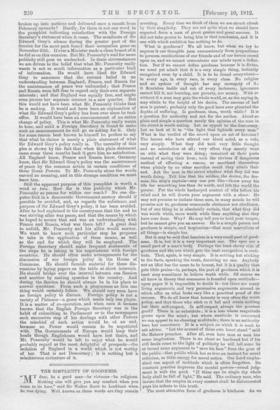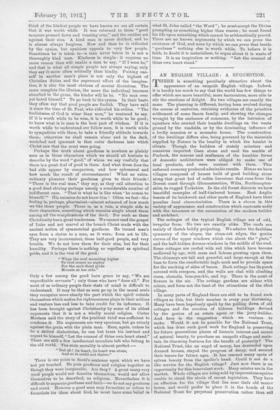Tits, SIMPLICITY OP GOODNESS.
,14 Y dear, be a good man—be virtuous—be religions. 1-/-1 Nothing else will give you any comfort when you come to lie here," said Sir Walter Scott to Lockhart when he, was dying. Well known as. those words are they remain arresting. Every time we think of them we are struck afresh by their simplicity. They are not quite what we should have expected from a man of great genius and great success. It did not take genius to bring him to that conclusion, and it is one with which ambition has nothing to do.
What is goodness ? We all know, but when we try to express it our thoughts pass unconsciously from propositions to persons, recollections of our friends and of our heroes crowd upon us, and we cannot concentrate our minds upon a defini- tion. But if we cannot define goodness because it is divine, we must yet admit that it is a very simple thing, instantly recognized even by a child. It is to be found everywhere—. in every age, in every race, in every class. No religion and no system of thought has any monopoly of it ; it flourishes inside and out of every inclosure ; ignorance cannot kill it, nor learning, nor poverty, nor money. With or without it a man may gain the whole world, or, as the saying is, may attain to the height of his desire. The success of bad men is patent; probably only the good have ever plumbed the depths of suffering. Is goodness, then, worth while ? It is a question for authority and not for the scribes. About so plain and simple a question surely the opinion of the man in the street is worth asking. Let us appeal to the democracy. Let us look at it in "the light that lighteth every man." What is the verdict of the crowd upon an act of heroism ? The heroes who have stirred our blood acted, as a rule, very simply. What they did took very little thought and no calculation at all ; very often they merely went on with what they were doing; remained at their poste instead of saving their lives; took the obvious if dangerous method of effecting a rescue, or sacrificed themselves when plainly by no other sacrifice oould they attain their end. Ask the man in the street whether what they did was worth doing. Tell him that the soldier, the doctor, the fire- man, the ship's captain—any one you like—threw away his life for something less than its worth, and left the world the poorer. Put the whole hackneyed contest of wits before his mind and he will drown your argument with a cheer. He may not promise to imitate these men, in many moods he will promise not to, goodness commands obeisance not obedience, but of one thing he is absolutely certain, that what they did was worth while, more worth while than anything else they have ever done. Why ? He may tell you to bold your tongue, but he cannot give you an answer. He is a simple person and goodness is simple, and inspiration—that most marvellous of all things—is simple too.
But it may be said that heroism is a very small part'of good- ness. It is, but it is a very important one. The eyes are a. small part of a man's body. Perhaps the least showy side of goodness and the one which gets the least recognition is recti- tude. That, again, is very simple. It is nothing but sticking to the facts, speaking the truth, deceiving no one. Anybody not an idiot has the sense to be honest, but it is a quality that gets little praise—is, perhaps, the part of goodness which it is least easy sometimes to believe worth while. Of course we all know in theory that commerce is founded upon rectitude— upon paper it is impossible to doubt it—but there are many living arguments and very persuasive arguments around us which offer us what looks very like a practical proof of the reverse. We do all know that honesty is very often the worst policy, and that those who stick to it fail and retain nothing but their self-respect. Is gall-respect always the greatest good? There is no substitute ; it is a loss whose magnitude grows upon the mind ; but where rectitude is concerned we can appeal to no cheering multitude ; there is no authority here but conscience. It is a subject on which it is weak to ask advice. "Let the counsel of thine own heart stand" said the Hebrew preacher. After all, even here man as man has some inspiration. There is no cheat so hardened but if his evil deeds come to the light of publicity he will toll some lie or invent some argument to " save his face" from the gaze of the public—that public which has so true an instinct for moral criticism, so little energy for moral action. Our Lord empha- sized one aspect of rectitude which is often forgotten. Its constant practice improves the mental powers—sound judg- ment is with the good. "If thine eye be single thy whole body shall be full of light," He said. The ordinary man, who insists that the umpire in every contest shall be disinterested pays his tribute to this truth.
The most attractive form of goodness is kindness. As we think of the kindest people we have known we are all certain that it was worth while. It was returned to them "good measure pressed down and running over," and the residue set against their sins. A kind man is never disliked, and he is almost always forgiven. Now and then he is ridiculed by the cynics, but cynicism appeals to very few people. Sometimes be is taken in—a men never taken in is not a thoroughly kind man. Kindness is simple : it requires no more reason than will enable a man to say, "If I were he," and that is what all simple people are always saying, only they say it more often critically than kindly. Putting one- self in another man's place is not only the highest of Christian duties and the supremest effort of the imagina- tion, it is also the most obvious of mental diversions. The more complete the illusion, the more the individual becomes absorbed in the game, the kinder will he be. "No man ever yet hated himself." To go back to the cynics. In their haste they often say that good people are foolish. They have said it since the time of St. Paul, who ridiculed his critics. "The foolishness of God is wiser than men," he ventured to say. If it is worth while to be wise, it is worth while to be good ; to know what is in man is the best part of wisdom. If it is worth while to understand our fellow men, it is worth while to sympathize with them, to take a friendly attitude towards them; otherwise we shall remain alone and in the dark, wretched and ignorant in that outer darkness into which Christ saw that the cruel were going.
Perhaps the truth about goodness is nowhere so plainly seen as in those characters which we should all hesitate to describe by the word "good," of whom we say ruefully that there is a great deal of good in them. And what dross does the bad side appear by comparison, and how ephemeral and how much the result of circumstances I What an extra- ordinary pleasure their goodness gives to their friends! "There is the real man," they say, as they call attention to a good deed shining perhaps among a considerable number of indifferent ones. "That is what he is like when he comes to himself.'" His enemies do not know him I Often we feel—the feeling is, perhaps, pharisaical—almost ashamed of how much we like these people. There is, as a rule, a simple side to their characters, something which remains single about them among all the complications of the devil. For such as these Christianity has a great tenderness. We cannot read the gospel of Luke and not marvel at the breach Christ made with the ancient notion of symmetrical goodness. He turned men's eyes from a statue to a man, as it were; from art to life. They are very inconvenient, these half-good people, and very lovable. We do not love them for their sins, but for their humility. Perhaps there is nothing so repellent as spiritual pride, and it is the vice of the good : "When the soul mounting higher To God comes no nigher For the arch-fiend pride Mounts at her side."
Only a few among the good have grace to say, "We are unprofitable servants " ; only those who have "done all." For most of us ordinary people their state of mind is difficult to understand. It may be that as men go up in the moral scale they recognize more clearly the part which the spirit outside themselves which makes for righteousness plays in their actions and venture less and less to take credit for its influence. It has been brought against Christianity by some of its ablest opponents that it is not a wholly moral religion. Cotter Morison said the story of the penitent thief was sufficient to condemn it. His arguments are very specious, but go utterly against the grain with the plain man. Here, again, unless he be a skilled dialectician, he can but trust his instinct and repeat to himself," Let the counsel of thine own heart stand." There are still a few intellectual moralists left who belong to the old world. The stoic morality is almost perfect :—
" But ahl its heart, its heart was stone, And so it could not thrive."
There is one point in Scott's sentence upon which we have not yet touched. He puts goodness and religion together as though they were inseparable. Are they ? A great many very good people would not describe themselves, would not allow themselves to be described, as religious. Nevertheless it is difficult to separate goodness and faith—we do not say goodness and creed. However a good man may formulate or refuse to formulate his ideas about God, he must have some belief in
what St. John called "the Word " ; he must accept the Divine prompting as something higher than reason ; he must found his life upon something which cannot be arithmetically proved. There are no known arguments by which we can prove the existence of God, and none by which we can prove that beside " goodness " nothing else is worth while. To believe it is faith, to doubt it is materialism, to argue about it is waste of time. It is an inspiration or nothing. "Let the counsel of thine own heart stand."











































 Previous page
Previous page